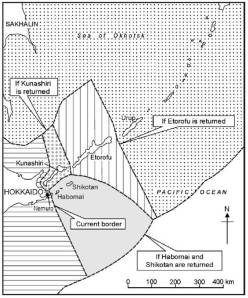| HomokHarcos said: I believe mainly Japanese. |
You believe wrong. No more Japanese population, basically all ethnic Russian (or other Soviet ethnicities now Russian citizens).
Essentially it is like Kaliningrad which used to be German, except that Japanese don't recognize it, unlike Germany.
| CosmicSex said: So, if Russia made a deal to give them back the islands, they should just keep their word. |
Japan is the one that refused to implement deal. US forced them not to make peace by threatening the US would not return Okinawa to Japanese sovereignty while Okinawa was still under full US military occupation. The deal hinges on mutual recognition, it can't be implemented by one side, establishing formal peace between the countries is just as much part of it as territorial recognition.
The Japanese position in fact doen't even acknowledge the position of post-war Japanese government which in it's own Parliament (Diet) the foreign minister of time stated that SF Peace Treaties did mean that it renounced it's sovereignty to the islands, apart from issue of recognizing Russian sovereignty over them. Japan now claims bizarre interpretation that because it considers area under a certain named adminitrative division, that is the only thing being referred to in treaty, not the geographic feature known as Kuril Islands. I leave it to the reader which would be the default interpretation when mentioning "Kuril Islands" without any nomenclature indicating internal Japanese provinces (in SF Treaty between all sides of war, not just Japan and USSR).
Anyways, Soviet Union was despite Japan having renounced the whole area (according to Japanese FM at time) willing to cede the smaller two islands/ rock group of rocks as gesture of good will to establish formal peace with Japan (Russia as Soviet successor state still has not made formal Peace with Japan over this). This was deal Japan made with USSR in 50's before US intefered because they didn't want Japan at peace with Soviet Union and having decent relations.
Interestingly, I saw paper by Japanese professor showing that despite deal ceding to Japan the two much smaller islands/rock group with Japan recognizing Russian sovereignty of the larger islands in dispute (with Japanese area to SE/Pacific side, Russian to NW/Okhotsk in continuity with rest of their Kuril chain) a standard application of territorial sea and EEZ (exclusive fishing/undersea mining rights) and the shape of the geography happens to mean Japan's combined area under the deal including land and sea EEZ would be like 49%, i.e. basically equal half, or probably slightly more than half of maritime EEZ given the land part is smaller. (the concept of EEZ did not exist at time Soviet/Japanese deal was crafted before being rejected by Japan) IMHO that is huge factor in making the old deal palatable to Japan, in that it is concrete basis for saving face, saying "we basically are splitting it" despite Russia retaining the larger island where it has much larger significant population present and which is the priority in establishing continuity with it's other islands. The EEZ marine resources are also the ones most readily relevant to Japan's actual population who live on Japanese large island of Hokkaido, they wouldn't need to change their home, fisherman can still operate from same ports which are near by.

This old deal, and Japan's previously claimed (to own parliament) recognition of it's own renunciation of sovereignty are barely ever mentioned in most news. They seem to think Japan could find an agreement with Russia which went way beyond that previous deal, even while ignoring it's previous acceptance.
https://www.japantimes.co.jp/opinion/2005/03/24/opinion/northern-territories-dispute-highlights-flawed-diplomacy/
Another aspect of a deal is as part of formal peace treaty, Russia seems to now be prioritizing that Japan establish actual peaceful friendly relations. In this regard, they oppose Japan allying with US against them, particularly regarding US-Japan "missile defence" which could be pointed against them. So in a way, this reflects same dynamic as when US shut down the earlier deal, except of course now Okinawa is returned to Japanese sovereignty so the US doesn't have that leverage, although US military presence of course continues by agreement of both countries' governments. The details are not public AFAIK, but I might guess that Russia would want guarantees from Japan to not station high-end missile defence or offensive missiles in northern Japan which could reach Russian territory, and not care what Japan does in southern Japan (the heavily populated part) which would be aimed against China and/or Korea(s). But high end missile defense or offensive missiles tend to have very large ranges, so I suspect southern Japan (Tokyo and south, let's say) may still be able to easily reach Russian territory, in which case the Russian concern could be focused more on US-Japanese military alliance.... No clear info on that AFAIK.
Anyways, Japan has been one of least enthusiastic of US military allies in joining the Russia hype sanctions bandwagon, albeit formally going along at least in part. Ideas like gas pipeline from Russia have floated around really since end of Soviet Union, and enhanced economic cooperation is envisioned as outcome of peace treaty, although mainsteam media often assumed this meant Japan could buy off Russia to accept deal far better than previous negotiated Soviet peace treaty, which hasn't turned out the case. Japan apparently is one of countries NOT yet getting exemption from Trump metal tariffs, which would reasonably imply more openness to dealing with Russia against US military wishes. But there has been on and off talks about this for decades and nothing happens. Japan complains when Russian officials visit it like any other Russian region, or re-equip the islands with modern military equipment like normal, but nothing really happens in end. I think they have negotiated special deals to facilitate visa-free travel for former residents or descendants to visit graves of family, but that's about it.
Last edited by mutantsushi - on 03 April 2018















